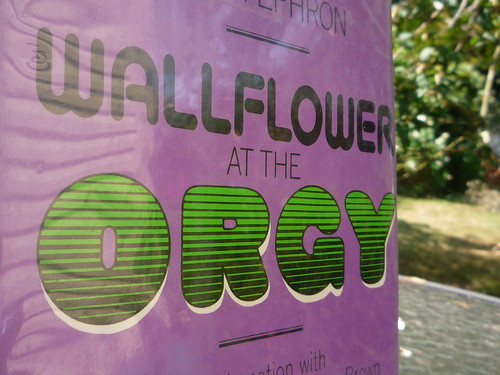
by Nora Ephron
Wallflower at the Orgy was chosen as my second foray into Summer Eprhonathon for two reasons. First, the title is so great -- it just is! although she explains it away as a metaphor for journalism. It's a nice metaphor, but I always like them better when I'm allowed to connect the dots myself. Second -- it was next book of hers I could get the quickest from the library. We just have one copy, but I only had to wait out the person who had it, then it was all mine. (although someone has done the same thing to me, and I'm now writing this on top of a late fine.)

I love the original cover! I love everything about it -- the purple, the bright green orgy with stripes, the black and white author photo on the back. Compare with the 2007 trade paperback, which, with its bashful naked legs, makes it look like a contemporary chick lit novel filled with lovingly described shopping sprees and also some part about a guy who pledges his troth to pay for future shopping sprees. No wonder so many people at Goodreads seemed disappointed with it; maybe they were expecting a novel or more recent essays, or at least essays about orgies, but got instead a collection of magazine articles from 40 years ago.
These essays were mostly written for women's magazines (Cosmopolitan) in the late 60's. Here's a quote from the introduction to give some context: "I should say that almost everything in this book was written in 1968 and 1969, and almost everything in it is about what I like to think of as frivolous things. Fashion, trashy books, show business, food. I could call these subjects Popular Culture, but I like writing about them so much that I hate to think they have to be justified in this way--or at least I'm sorry if they do." She gives it the old non-justification justification (sort of like the explanation of the title). It's at once bold and apologetic -- is that how it was to be a smart, ambitious woman in that era? Rock the boat, but don't tip it over? Or is it nothing to do with that and merely an artifact of being a smart woman taking on subjects considered by The Establishment to be trivial? (I've been watching Mad Men, so this is on my mind.)
It's so interesting, not just because I also like the "Popular Culture," but to look at it from 40 years later. I realize that this kind of thing may not be for everyone, but I found it fascinating. It was like being in a time machine! a feminist time machine!! Some things seem dated and old fashioned (referring to herself as Mrs. Dan Greenburg, for one) but on the other hand, extreme political correctness was not yet the order of the day so there is a quality of unselfconscious plainspokenness sometimes missing from modern journalism. It's written at a fluid time in feminist history -- things had changed a lot and were about to change a lot more, but it was recent change so the Old Way hovers over everything. Plus, she's so funny -- but in her particular sly, dry fashion that's always waiting for you to catch up, rather than in obvious nose-honking ways.
some of my favorites:
The Food Establishement -- This is about the great Time-Life Cookbook wars. My grandfather was a huge Time-Life fan and I grew up with various collections all around. (I think maybe because he used to sell Encyclopedia Britannica, so he was naturally kindly disposed to a subscription book series.) ANYWAY. I had no idea there was this big Foodie culture war around them; as much as I enjoyed reading about the bitchy kitchen gossip, it's also an interesting view on how we ate then, which allows for rumination on how we eat now.
Women's Wear Daily Unclothed -- oh, this is such a crazy fun article. It's historical (how did a trade magazine that featured "news of latex futures, new trends in sewing machines, and indiscriminate reports on every collection from shoes to hatpins" evolve to become a Must Read for the most fashionable?) and contemporary (how do they know what Jackie O. is going to wear?). Mostly, I loved it for tidbits like this: "It is catty, breathless, and loaded with shorthand expressions and non sequiturs. SENTENCES ARE CAPITALIZED FOR NO APPARENT REASON AND SEEM TO SNAP AND CRACKLE RIGHT OUT OF THE PAGE."
I really liked her two pieces on Mike Nichols -- one is a straight up profile/interview (December 1968) and one is a piece from on location with Catch 22 (May 1969). I think Mike Nichols is interesting (read Mark Harris's Pictures at a Revolution -- SO GOOD!) so I enjoyed reading the interview, but it wasn't just about him. Considering what she went on to do (and does now), this exchange in particular caught my attention:
Q: This is a naive question, but film is a very mysterious thing to me, and I don't understand how you just went out there and made a movie. How did you find out about all those mysterious sound devices and mysterious words like "looping"?
NICHOLS: I just held my nose and jumped in.
Q: But did you feel like an imbecile?
NICHOLS: I still do.
Q: You do?
NICHOLS: Oh, of course. All the time. Don't you?
Q: Oh, no, because I'm not doing anything terribly hard. It's just me and a typewriter. It's not me and a million technicians and budgets and deadlines.














Be First to Post Comment !
Post a Comment